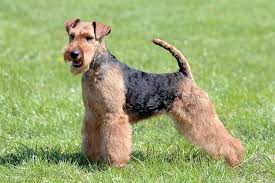
Welsh Terrier
Conditions of detention
Welsh Terriers are adaptable and can thrive in various living environments, including urban apartments and rural homes. They do best in homes with access to outdoor spaces where they can exercise and explore.
Useful Fact:
These dogs are highly energetic and require regular exercise to stay happy and healthy. Daily walks, playtime, and mental stimulation are essential to keep them engaged.
Nutrition and diet
A balanced diet rich in high-quality proteins and essential nutrients is crucial for the Welsh Terrier to support its active lifestyle. High-quality commercial dog food or a diet incorporating lean meats, vegetables, and grains is recommended.
Useful Fact:
Feeding a diet that supports their energy levels and muscle mass helps maintain their health and vitality, especially given their active nature.
Health
Welsh Terriers are generally healthy dogs but can be prone to certain genetic conditions such as hip dysplasia, allergies, and eye disorders. Regular veterinary check-ups are essential to monitor their health.
Useful Fact:
Regular screenings for common health issues, such as eye examinations, can help catch potential problems early and ensure they receive appropriate care.
Grooming and care
The Welsh Terrier has a dense, wiry coat that requires regular grooming to prevent matting and to remove loose hair. Regular brushing and occasional hand-stripping are needed to maintain their coat’s texture and appearance.
Useful Fact:
Their coat is relatively low-shedding, making them a good choice for people with mild allergies, but grooming is important to keep their coat in top condition.
Education and training
Welsh Terriers are intelligent and eager to please, making them relatively easy to train. However, they can also be independent and may require consistent, positive reinforcement methods for effective training.
Useful Fact:
Early socialization and obedience training are crucial to ensure they develop into well-mannered dogs that are comfortable around people and other animals.
Toys and entertainment
These dogs enjoy toys that challenge their minds and bodies, such as puzzle toys, fetch toys, and interactive games. Engaging in activities like agility training and scent work can be very stimulating for them.
Useful Fact:
Providing a variety of toys and regular playtime helps keep them mentally and physically active, preventing boredom and destructive behavior.
Safety
Due to their strong prey drive and high energy levels, Welsh Terriers should be kept in a secure area when outdoors. They need to be monitored to prevent them from wandering off or chasing wildlife.
Useful Fact:
A well-fenced yard is essential to give them the freedom to roam safely without the risk of escaping.
Accessories
Sturdy collars, harnesses, and leashes are important for managing the Welsh Terrier during training and outdoor activities.
Useful Fact:
Using a harness can provide better control and prevent neck strain, especially during walks and training sessions.
Socialization
Welsh Terriers are friendly and form strong bonds with their families but can be reserved with strangers. Early and consistent socialization is important to ensure they are comfortable in various environments.
Useful Fact:
Introducing them to different people, animals, and settings from a young age helps them become well-adjusted and confident adults.
Travel and Transportation
Welsh Terriers can travel well if they are accustomed to it from a young age. Ensuring they have a comfortable and secure space in the vehicle is important.
Useful Fact:
Using a travel crate or a harness designed for car travel ensures their safety and comfort during trips.
Behavior and psychology
The Welsh Terrier is known for its loyalty, intelligence, and spirited nature. They form strong bonds with their families and are naturally social dogs.
Useful Fact:
Understanding their energetic and inquisitive nature and providing proper training helps manage their behavior and ensures they are happy and well-behaved companions.
Legal aspects
Owners should comply with general dog ownership laws, such as licensing, vaccination requirements, and leash laws.
Useful Fact:
Keeping up with legal aspects ensures that Welsh Terriers are well-integrated into their communities and safeguards their health and well-being.


